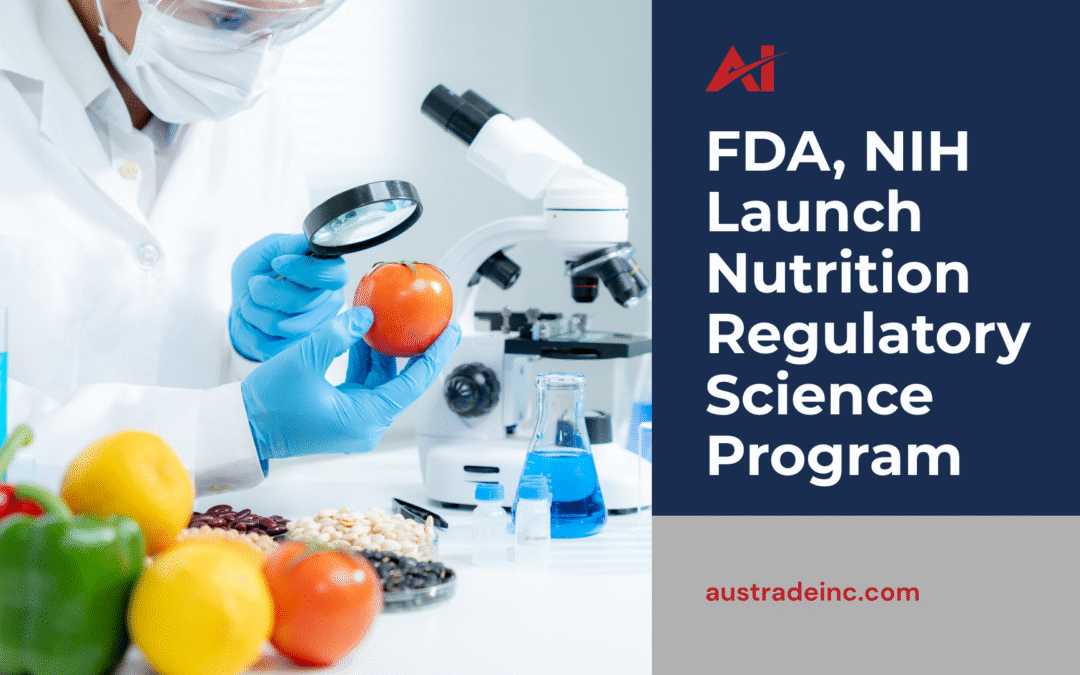FDA, NIH Launch Nutrition Regulatory Science Program
The FDA, NIH, along with top scientists and nutrition experts, have come together with the goal of advancing the gold standard of nutrition and food science.
In May 2025, the FDA, in collaboration with the NIH (National Institute of Health), announced a new Nutrition Regulatory Science Program. The joint initiative aims to research and tackle root causes of diet-related chronic diseases with evidence-based science. The FDA will offer critical expertise in regulatory science, while the NIH provides infrastructure for the scientific research.
- The health impact of ultra-processed foods (UPFs).
- The role of certain food additives in metabolic health, possibly contributing to chronic diseases.
- The role of infant and maternal nutrition in health outcomes across lifespan, including autoimmune diseases.
This collaboration aims to generate evidence that informs US policy and regulatory decision-making. The program represents a significant shift in how US federal agencies will approach food research and regulation moving forward.
Let’s explore the incoming implications and opportunities for North American food and beverage brands.
Clean Label Ingredient Transparency
As the program investigates the correlation between food and health, consumers will increasingly choose brands that prioritize clean label ingredients. Companies already embracing minimal processing, natural ingredients and transparent supply chains are likely to experience accelerated growth.
The key differentiator will be the ability to maintain product flavor, quality and shelf-life while meeting clean label demands. Brands that deliver both functionality and transparency will capture significant market opportunities as consumer awareness grows.
Functional Food and Beverage Innovation
Increased consumer interest in the correlation between food and health creates a favorable environment for food and beverage innovation. Brands that develop products with scientifically proven, targeted health benefits will be well positioned to capitalize.
The program’s research findings will likely unlock innovation opportunities in areas such as cognitive function, immune support, gut health and metabolic wellness. Brands that effectively translate emerging research findings into consumer-friendly products are likely to gain advantages in rapidly growing segments.
Opportunities for Certain Food & Beverage Categories
Convenience, Packaged Foods
Ultra-processed foods are defined as food that undergoes multiple processing steps, and contains little, if any, whole food ingredients. Ready-to-eat or ready-to-heat products that are commercially manufactured and low in essential nutrients are considered ultra-processed food. UPFs tend to be high in sugar, fat, and salt, and low in fiber. These include preservatives and additives, artificial colors, flavor enhancers, synthetic emulsifiers and sweeteners.
Companies in the consumer-packaged goods (CPG) sector should consider increasing investments in research and development for reformulation efforts. Brands that effectively reduce processing levels, replace synthetic additives with natural ones, and work to improve nutritional profiles across packaged foods will benefit.
Infant and Maternal Nutrition
Significant gaps still exist in understanding how infant and maternal nutrition affect health outcomes and overall lifespan. One thing we do know for certain is that the first 1,000 days of life mark a vital period for establishing lifelong health. Major global health organizations agree that breastmilk is the optimal form of exclusive infant nutrition for the first six months of life.
Challenges remain, however, for many mothers across the globe and in the United States. From maternal workplace obligations to lack of milk production, infant formula supplementation is often necessary for proper development. While carefully regulated, many infant formula brands have still not transitioned to healthier, more natural additives (such as Austrade’s Organic & Non-GMO Sunflower Lecithin).
As the new NRSP initiative unfolds, infant and maternal nutrition brands should expect the highest standards for safety testing and transparent ingredient profiles.
The key for brands to thrive?
Our take: Reformulate with highly functional, clean label ingredients without compromising taste or product functionality.
Beverages
Beverages with a high sugar content or synthetic additives should expect to face increased scrutiny and regulatory pressure.
As it stands, sugar-sweetened beverages are a leading source of added sugars in the United States. Excessive intake of added sugars and synthetic additivescan contribute to metabolic disruption. This occurs by way of rapid blood sugar spikes, gut health issues, low-grade inflammation and energy crashes. Excessive consumption may also lead to other health risks over time.
Brands in the functional and enhanced beverage categories may particularly benefit from research validating specific health benefits. Companies with formulations that still include synthetic ingredients should prioritize reformulation efforts.
For example, brands with plant-based coffee creamer formulations may opt to replace polysorbate with a natural, allergen-free replacement for synthetic additives such as Non-GMO Hydrolyzed Sunflower Lecithin Powder.
Embracing the Gold Standard of Nutrition and Food Science
The Nutrition Regulatory Science Program represents a pivotal moment for the food and beverage industry. The era of simply meeting minimum regulatory requirements is coming to an end.
While the joint initiative introduces drastic regulatory challenges, it also creates new innovation opportunities. It offers a chance to build sustainable competitive advantages and stronger consumer relationships in the new era of nutrition and food science.
Tomorrow’s leading brands will be those who understand that both functionality and health transparency are equally important to consumers. Products positioned at the intersection of ingredient transparency, regulatory compliance and consumer health will thrive.
The best way to ensure success is by forming strategic partnerships with clean label ingredient suppliers who source natural, functional ingredients with transparent supply chains.
Partner with Austrade Inc. for Your Next Innovation
As the food and beverage industry continues to evolve, our team of ingredient experts are ready to help you leverage the full power of Austrade’s Organic & Non-GMO ingredients.
With almost 30 years of expertise in the North American market, Austrade delivers innovative solutions without compromising functionality. Our products are predominantly sourced from Europe, and backed by full traceability and a strong supply chain.
A partnership with Austrade Inc. ensures your products deliver accurate clean label product claims and performance quality that today’s consumers expect. Connect with us today to learn more and explore future opportunities.
